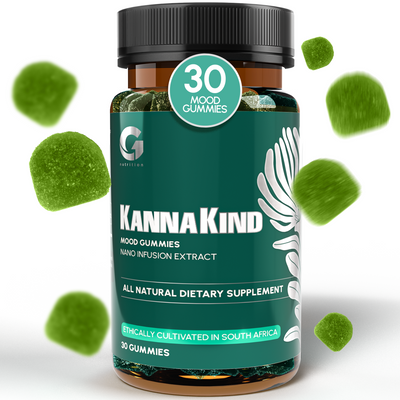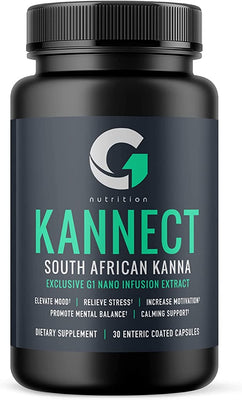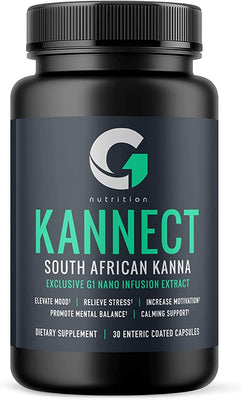Introduction: The Growing Interest in Kanna
In recent years, there has been a growing shift toward natural wellness solutions. People are increasingly looking for alternatives to pharmaceuticals that support mental health, stress management, and focus—without the heavy side effects that often accompany prescription drugs. This shift has placed a spotlight on Kanna (Sceletium tortuosum), a traditional plant from South Africa that has been used for centuries for its calming and mood-enhancing properties.
Today, Kanna has made its way into the modern wellness world through supplements like capsules, tinctures, teas, and gummies. One of the most popular and convenient forms is Kanna supplement gummies, which combine natural plant extracts with enjoyable, easy dosing. (If you haven’t yet, you can read our blog on Kanna Supplement Gummies: Benefits, Uses, and Why KannaKind Stands Out for the full picture.)
But before incorporating any new supplement into daily life, most people have two critical questions:
-
Is Kanna legal?
-
Is Kanna safe to use?
This guide takes a science-based look at those questions, reviewing research, cultural history, clinical studies, and regulatory perspectives to give you a clear, trustworthy answer.
Understanding Kanna’s Legal Status
When considering whether to try Kanna, legality is often the first concern. The rules around plant-based supplements can vary depending on country, state, and even how the product is marketed. To better understand where Kanna stands, let’s break it down.
Kanna in the United States
In the U.S., Kanna is legal at the federal level. It is not classified as a controlled substance and does not appear on the DEA’s list of restricted plants. That means products containing Kanna—whether gummies, capsules, or teas—can be legally sold and purchased.
However, legality does not mean it’s fully unregulated. The FDA (Food and Drug Administration) monitors supplements under the Dietary Supplement Health and Education Act (DSHEA). While the FDA does not pre-approve supplements like it does pharmaceuticals, companies must ensure that:
-
Ingredients are safe for consumption.
-
Labels are accurate and truthful.
-
Products are manufactured under Good Manufacturing Practices (GMP).
This means that Kanna products sold by reputable companies—like G1 Nutrition—are both legal and regulated under dietary supplement laws.
Pro Tip for Consumers: Always buy from trusted brands that provide third-party lab testing and transparent labeling. This ensures you’re getting pure Kanna without contaminants or misleading claims.
International Legal Perspectives
While Kanna is legal in the United States, the situation can differ in other countries. Here’s a breakdown:
-
Europe: In most EU countries, Kanna supplements are legal to buy and use. However, some nations may classify it under “novel foods” or require extra labeling.
-
Canada: Kanna is legal but may fall under the Natural Health Products framework, which requires compliance with Health Canada’s standards.
-
Australia & New Zealand: Kanna is not listed as a controlled substance, but supplements may be restricted to approved imports or licensed sales.
-
Asia: Legal status varies widely, with some countries restricting imports of all herbal supplements not pre-approved by local regulators.
Travel Consideration: If you’re planning to take Kanna supplements abroad, check the regulations of your destination country. While most places do not criminalize Kanna, customs officials may restrict plant-based products without proper labeling.
Future Legal Outlook
As natural supplements grow in popularity, regulatory bodies worldwide are paying closer attention. There are two key trends to watch:
-
Increased Oversight: Agencies like the FDA and EFSA (European Food Safety Authority) may tighten requirements for clinical evidence and labeling.
-
Mainstream Acceptance: As more research supports Kanna’s effectiveness, it may follow the path of supplements like Ashwagandha or CBD, which moved from niche markets to mainstream health stores.
For now, the good news is that Kanna is widely legal and accessible, making it easier for people to explore its benefits responsibly.
Is Kanna Safe to Use?
Now that we’ve established that Kanna is legal in most parts of the world, the next question is: Is it safe?
The short answer is yes, when used responsibly. Kanna has been consumed traditionally for hundreds of years and is now backed by growing scientific research. But, as with any supplement, safe use depends on dosage, individual health conditions, and interactions with other substances.
Clinical Research on Safety
Several human studies and animal trials have evaluated the safety of Kanna (Sceletium tortuosum). Findings suggest that:
-
Short-term use of Kanna is well tolerated. Most people experience only mild, if any, side effects.
-
Long-term use appears safe when taken in moderate daily doses. Research has not identified significant risks of dependency or organ toxicity.
-
Standard dosage ranges (typically 25–50 mg of standardized extract per serving) are considered safe for daily use.
One published study in the Journal of Ethnopharmacology found that Kanna extracts used as a natural serotonin reuptake inhibitor (SRI) improved mood and reduced anxiety without the severe side effects linked to prescription antidepressants.
Possible Side Effects
Most users tolerate Kanna well, especially when taking recommended doses. However, some mild side effects may occur, particularly if higher doses are used:
-
Nausea or stomach discomfort
-
Mild headache
-
Dizziness or fatigue
These effects are usually temporary and resolve as the body adjusts.
Who Should Avoid Kanna:
-
Pregnant or breastfeeding women (lack of safety data).
-
People taking SSRIs, SNRIs, or MAOIs (risk of serotonin overload).
-
Individuals with severe psychiatric conditions should consult a healthcare provider before use.
Interactions with Medications
Because Kanna naturally affects serotonin levels, it should not be combined with prescription antidepressants or stimulants. Doing so could increase the risk of serotonin syndrome, a rare but serious condition.
Other possible interactions:
-
Stimulants (like caffeine or Adderall): May increase restlessness in sensitive users.
-
Alcohol: Combining with high doses may enhance sedative effects.
Safe Practice: If you are currently taking medications for mood, anxiety, or focus, consult your doctor before adding Kanna.
Comparing Kanna Safety to Other Mood Enhancers
Kanna vs. Ashwagandha
-
Ashwagandha: Safe for most, but may affect thyroid or blood sugar.
-
Kanna: More targeted for mood and serotonin pathways; fewer endocrine effects.
Kanna vs. Rhodiola
-
Rhodiola: Can be overstimulating for some, especially at higher doses.
-
Kanna: Calming, not stimulating—better suited for anxiety relief.
Kanna vs. St. John’s Wort
-
St. John’s Wort: Known for strong drug interactions (birth control, antidepressants, etc.).
-
Kanna: Fewer interactions, but caution is still needed with SSRIs.
Comparison Table:
|
Supplement |
Key Benefits |
Safety Concerns |
Best For |
|
Kanna |
Mood, anxiety relief, focus |
Avoid with SSRIs |
Stress, calm focus |
|
Ashwagandha |
Stress, sleep, hormone support |
May affect thyroid |
General stress & recovery |
|
Rhodiola |
Energy, endurance, fatigue |
Can overstimulate |
Fatigue, focus boost |
|
St. John’s Wort |
Mild depression support |
Strong drug interactions |
Mood balance |
Best Practices for Safe Kanna Use
Recommended Dosage and Form
Kanna comes in many forms:
-
Gummies – Consistent dosage, convenient, and tasty.
-
Capsules – Portable, but may take longer to digest.
-
Teas/tinctures – Traditional, but less precise dosing.
Why gummies stand out: They provide controlled, pre-measured servings that make it easy to track effects.
Tips for First-Time Users
-
Start with one gummy (low dose).
-
Track how you feel over the first few hours.
-
Increase only as needed for desired effect.
Combining Kanna with a Healthy Lifestyle
Kanna works best when paired with:
-
A balanced diet
-
Regular exercise
-
Stress-management practices (yoga, meditation, journaling)
-
Consistent sleep
Evidence From Science and Experts
Research Findings on Safety and Efficacy
Several studies highlight Kanna’s potential:
-
Mood support: Improved resilience to stress in clinical trials.
-
Anxiety relief: Significant reduction in self-reported anxiety levels.
-
Focus: Positive effects on attention and cognitive performance.
Expert Opinions and Herbalists’ Insights
Herbal practitioners often recommend Kanna as:
-
A non-addictive alternative to pharmaceutical options.
-
A gentle, plant-based way to promote emotional balance.
Conclusion: The Legal and Safe Path to Using Kanna
Kanna is both legal in most countries and safe when used responsibly. Clinical research supports its role as a natural mood and stress supplement, with a favorable safety profile compared to many alternatives.
For the easiest, most reliable way to experience its benefits, try KannaKind Kanna Gummies—a lab-tested, nano-infused supplement designed for maximum absorption and convenience.
Keep learning with our related guides:
Frequently Asked Questions
1. Is Kanna FDA Approved?
No dietary supplements are FDA-approved. However, they must meet FDA safety and labeling standards.
2. Can Kanna Be Taken Daily?
Yes, research shows daily use is safe at recommended doses.
3. What Happens if You Take Too Much Kanna?
Higher doses may cause nausea, drowsiness, or headaches. Stick to the serving size on the label.
4. Is Kanna Addictive?
No, Kanna is not addictive and does not create dependency.



